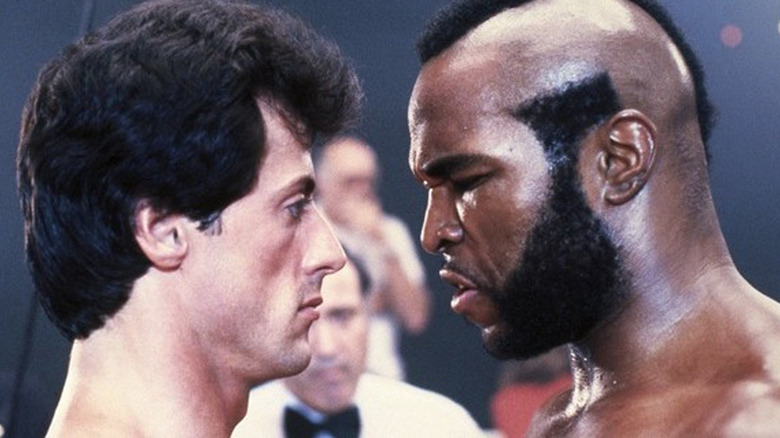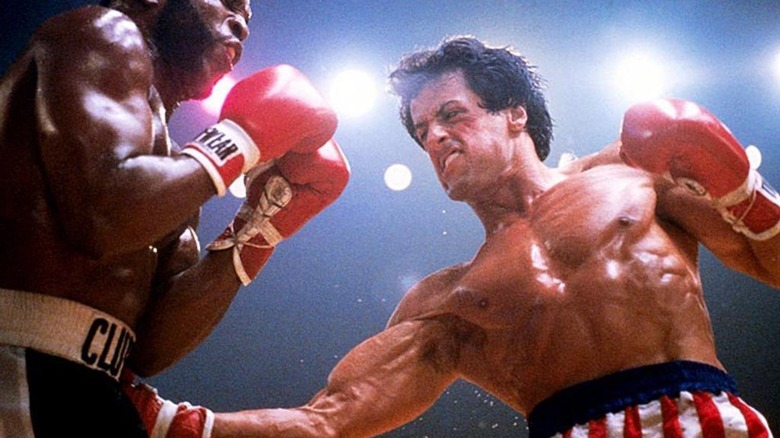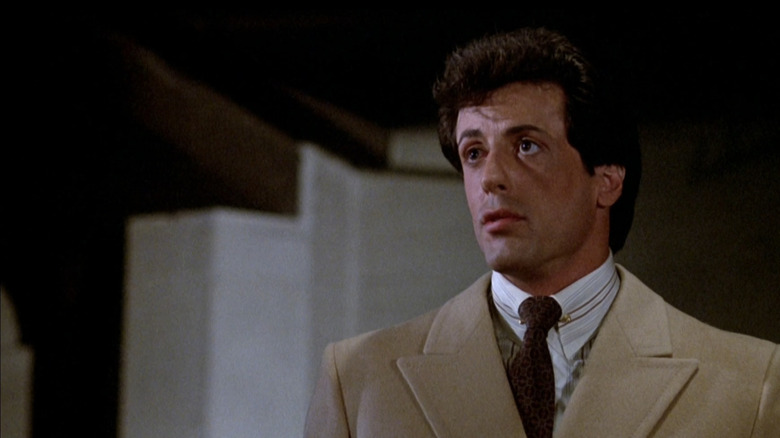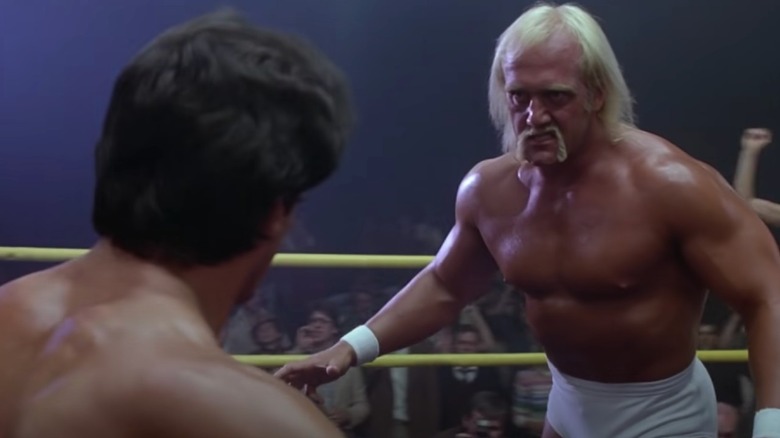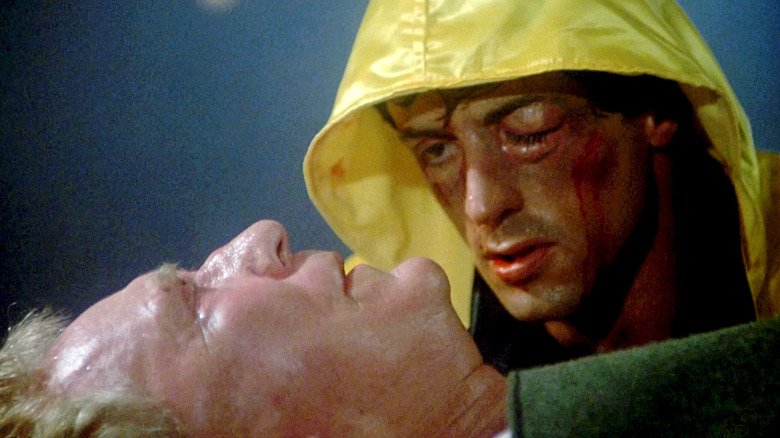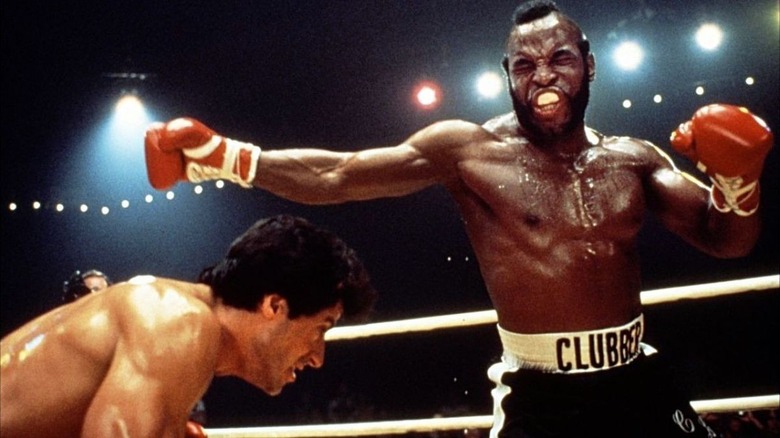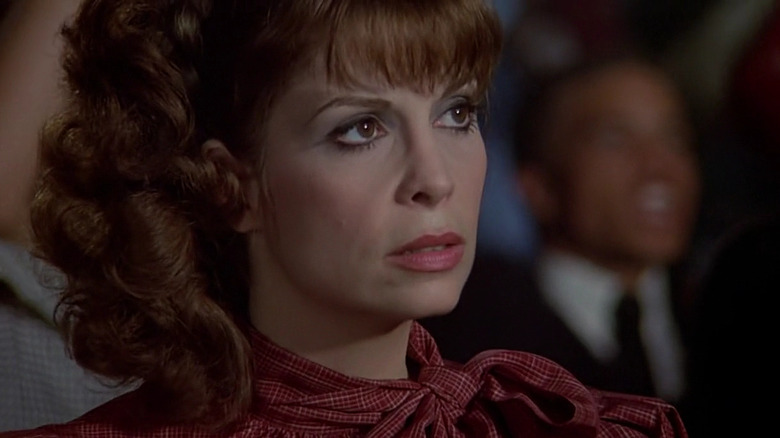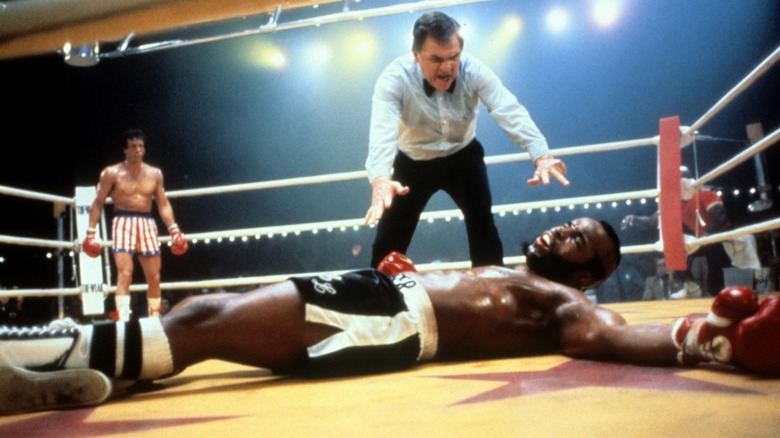Rocky III Ending Explained: Finding New Ways To Pity The Fool
What do you do when your underdog is no longer the underdog? That was the challenge Sylvester Stallone faced when it came to writing "Rocky III"; now his loveable slugger from Philadelphia was heavyweight champion after defeating Apollo Creed (Carl Weathers) in the previous film. Stallone's solution, at least at first, was to go out with a massive bang.
"Rocky III" marks the point when the franchise crosses over into cartoonish excess, although Stallone's original concept for the film makes what we got look like a slice of kitchen sink realism. In a couple of interviews with Roger Ebert after "Rocky II," Stallone talked about his plan to end the Rocky Balboa saga with the third film, taking the "half-blind" champ to Europe to face his latest rival in the greatest gladiatorial arena in the world, the Roman Colosseum. Not only that, he'd get to train on the Spanish Steps and maybe even visit the Pope. If the current Pope didn't want to be in the film, no worries: "We get another Pope." Stallone had all the angles figured out and, if he had the courage, he even planned to kill off Rocky at the end.
Those interviews were in 1979 and by the time "Rocky III" hit theaters three years later, Stallone had scaled his back ambitions somewhat. But only a little: It is still the most incident-packed and outright entertaining installment of the whole franchise, featuring one of Rocky's most menacing villains. He also worked out a way to make Rocky the underdog again, although he didn't have the nerve to snuff the character who made him a superstar. No spoiler alert is required there, as you've probably noticed he's appeared in another three sequels plus the "Creed" movies. Let's take a closer look.
So what happens in Rocky III again?
Three years after Rocky Balboa (Sylvester Stallone) shocked the world by claiming the heavyweight title in "Rocky II," the Italian Stallion is on a high. He has easily defended his title against ten challengers and he's raking in plenty of extra cash from side gigs and making guest appearances on "The Muppet Show." It's good old Rocky, though, so he also does a lot for charity too, like taking on Thunderlips (Hulk Hogan), the world wrestling champion, in a fundraising event that gets out of control.
Watching on with a look of ferocious intent is James "Clubber" Lang (Mr. T), a fearsome independent fighter battering his way through the ranks. Once he is ranked number one, Lang challenges the champ at the unveiling of a statue in his honor, just as Rocky is announcing his retirement.
Lang goads Rocky into accepting the fight, but his manager Mickey (Burgess Meredith) wants no part of it. He thinks Rocky's fame and fortune have made him soft and reveals that he hand-picked the title challengers to prevent his fighter from taking any serious punishment. Balboa is devastated that his title defense has been a sham, but he talks Mickey into sticking around for one last fight. Balboa's training is half-hearted, and he is further distracted on the night of the fight when Mickey suffers a heart attack. The bout is over in two brutal rounds and Mickey dies in the dressing room.
Where now for Rocky? He's lost his title and his manager, and he also lacks self-confidence now he knows he isn't the fighter he thought he was. Enter his old foe Apollo Creed, who can show Balboa a thing or two about boxing. But can he help the crestfallen Rocky regain the "Eye of the Tiger" before the rematch?
What happened to Rocky's eye injury?
One notable absence from "Rocky III" is something that drove a huge part of the plot of its predecessor: Rocky's eye injury. As you may recall, he took such a battering from Apollo Creed in their first fight that he suffered a detached retina and could lose his eyesight if he fought again. That was why, when Rocky accepted Apollo's offer to a rematch, Mickey made his fighter switch from his southpaw stance to orthodox to protect his vulnerable eye.
For such a potentially life-changing injury, it is never mentioned in "Rocky III." Early in the film, Rocky's jealous brother-in-law Paulie (Burt Young) says "You got your face all fixed up," which might be a vague suggestion that Rocky got his eye sorted out through surgery. I think it is more likely a nod to Stallone's appearance; he looks less like himself in the previous two movies than his statue that is unveiled later in the movie.
Stallone's striking new look is partly down to the ridiculous training regime he put himself through to get shredded for the part. In an Instagram post, the actor revealed that he reduced himself to his lowest-ever weight of 166 pounds with just 2.8% body fat. To achieve this, he took a punishing diet that consisted of "very small portions of oatmeal cookies made with brown rice and up to 25 cups of coffee a day with honey and a couple of scoops of tuna fish." He also acknowledged it was a dangerous approach, resorting to doing handstands between takes in the fight scenes to get some blood flowing to his head. Compared to his more fleshy build in the first two films, it is no wonder he looks different after all that.
Success makes Rocky lose his edge
Some critics at the time questioned the necessity for "Rocky III," but Sylvester Stallone managed to find an interesting and believable arc for the champ just as his own career was hitting its peak. The film was released just a few months after "First Blood," where Sly first portrayed his next iconic movie character, John Rambo.
It makes sense that Rocky would find himself distracted by wealth and celebrity, going from his previous life scratching a living in a poor Philadelphia neighborhood to living in an ostentatious mansion within a few years. Rocky and his wife Adrian (Talia Shire) are clearly enjoying the good life, as we notice from their increasingly fine clothing in the opening montage sequence, and very comfortable living makes him lose his focus.
As the champion, he attains all the wealth that Apollo Creed has enjoyed for so long, although Apollo appeared to have the intellect and upbringing to handle it better. He came from a middle-class background so perhaps the step up wasn't so jarring for him when he achieved success.
Of course, Rocky going soft would provide enough of a threat in the face of a fighter as mean and hungry as Clubber Lang, so Stallone needed an extra few plot points to bring Balboa low and make him an underdog again. The revelation that Mickey picked weak challengers to protect him is neat, acknowledging that Rocky was never a particularly good fighter in the first place; like his real-life inspiration, Chuck "The Bayonne Bleeder" Wepner, he's a journeyman slugger who succeeded through blood-and-guts determination rather than skill.
Mickey's death
Balboa's relationship with his manager Mickey wasn't always a loving one. In "Rocky," he initially refused the grizzled gym owner's offer to train him because the old man treated him like a bum in the past. After a heartfelt speech, however, he agreed to take Mickey on board and the classic partnership was struck, and Mickey proceeded to teach Rocky how to "eat lightning" and "crap thunder." Burgess Meredith's performance earned the veteran actor, whose career began back in the '30s, an Oscar nomination, his second back-to-back after also receiving a nod for his turn in "The Day of the Locust" the year before.
By the third film, Mickey had become a member of the Balboa family, a father figure as well as a mentor to the Italian Stallion, so his heart attack just before the first fight against Clubber Lang understandably throws Rocky off his stride. It is foreshadowed when Mickey suffers chest pains during the charity match against Thunderlips, and Lang gets extra villain points for triggering the heart attack by shoving the old man when a brawl between the two fighters almost breaks out backstage.
Mickey's death in the changing room after the fight is the most emotional scene in the whole franchise, although some might argue Apollo's demise at the hands of Ivan Drago (Dolph Lundgren) in "Rocky IV" trumps it. It is a fitting way for the curmudgeonly old trainer to bow out of the series, and after that, we just can't wait to see Rocky take Clubber down. You'd think it would provide him with all the motivation he needed, but it looks like a lost cause for a while, even with Apollo's help.
The eventful rise of Mr. T
These days, Mr. T cuts a rather eccentric figure, but it's hard to overstate just how big he was in the '80s. After making his striking debut as Clubber Lang in "Rocky III," he became a sensation in "The A-Team" where he played B.A. Baracus, the hulking mechanic with a fear of flying. He quickly became the show's most popular character, much to the disgruntlement of its supposed main star, George Peppard. His trademark mohawk haircut, feather earrings, and copious amounts of gold jewelry made him one of the '80s most recognizable celebrities, but all those things were already in place before he found stardom.
Born Laurence Tureaud, he changed his name to Mr. T in response to the disrespect he saw his family suffer. He told Playboy (via Festival Reviews):
"I think about my father being called 'boy,' my uncle being called 'boy,' my brother, coming back from Vietnam and being called 'boy.' So I questioned myself: 'What does a black man have to do before he's given the respect as a man?' So when I was 18 years old ... I self-ordained myself Mr. T so the first word out of everybody's mouth is 'Mr.' That's a sign of respect that my father didn't get, that my brother didn't get, that my mother didn't get."
After a series of menial jobs, his imposing physique helped him find work as a bouncer and a bodyguard, minding high-profile stars like Michael Jackson, Steve McQueen, and even boxers such as Muhammad Ali and Joe Frazier. His striking appearance made him stand out among the contenders on a show called "America's Toughest Bouncer," which is where Sylvester Stallone's Casting Director, Rhonda Young, spotted him. He was a perfect fit for the role of Lang, which also gave him his catchphrase, "I pity the fool."
Adrian, as always, gives Rocky the motivation
After Lang demolishes him in the first fight, Rocky faces a problem. He is up against a brutal hitter who is faster, stronger, and far hungrier than he is. Thankfully, Apollo Creed steps in. His motives remain vague other than wanting a favor from Rocky, but the table for one of the great macho bromances of the '80s.
Apollo takes Rocky, Adrian, and Paulie out to Los Angeles to train, using the flea-bitten gym where he started out as a base. He wants to improve Rocky's footwork, speed, and technique, but most of all, he wants to give him back the eye of the tiger, that hungry look Rocky had when he faced Apollo in their two epic fights. Creed drops the title of the Survivor song that would become synonymous with the franchise a whole bunch in these scenes. Despite all the expert advice, Rocky still can't get over Mickey's death and the eye-opener that, as a boxer, he's just a bit s**t. He's lost his edge and he knows it, and the prospect of facing Clubber again scares him.
It looks like it's all over, but Adrian steps in to give Rocky a pep talk. He might have had Mickey in his corner before, but it was always Adrian who gave him the courage and drive to actually go out and achieve his dreams. In "Rocky II," his heart really isn't into his second fight against Creed until Adrian awakes from her coma just in time to give him her blessing, and she comes up with the goods again here. Buoyed by her words, it's time for the cheesiest training montage of the entire series which culminates in Rocky and Apollo cavorting in the sea together.
The final showdown
Before the fight, Apollo gives Rocky the stars-and-stripes shorts that he wore in their first fight, while Clubber gives his prediction for the bout ahead: "Pain." The symbolism couldn't be more clear; the shorts reiterate his status as America's true champion over a surly and undignified opponent. The bell rings and Rocky flies out of his corner looking far faster, sharper, and more skillful than ever before. Lang hardly lands a shot because Rocky is too quick for him. It's a great round for the challenger and Lang is enraged.
The second round starts with Rocky again on top, but the tide turns when Clubber hurls him into a corner and brutally hammers away. Rocky suddenly can't escape and he takes a brutal beating, knocked down twice. Somehow he gets up and antagonizes Clubber after the bell rings. In the corner, he reassures Apollo he has a plan. In the third round, Rocky takes even more punishment while still goading Lang. Rocky's strategy becomes clear; he's using Clubber's fury against him, making him swing wild punches while using his newfound ability to avoid blows. It's a risky tactic, but Rocky waits for his chance and then counter-attacks, knocking Lang down.
For once, Rocky Balboa is using his experience and cunning to his advantage, assessing the fight as it unfolds. It's a big development and it helps him regain his title against the odds.
Some while after the fight, we finally find out what favor Apollo wants from Rocky: an unofficial rematch in the gym away from the cameras. They get into the ring together, trade a little banter, then both throw a big punch. Freeze frame, and fans of the series would have to wait 33 years until "Creed" to find out who won. But I'm not going to spoil that here.
